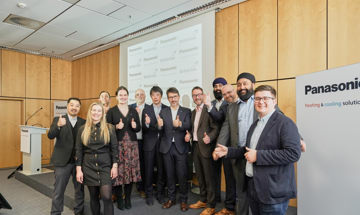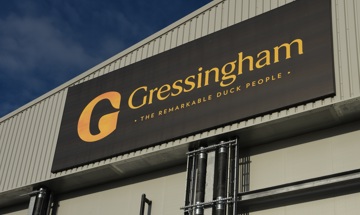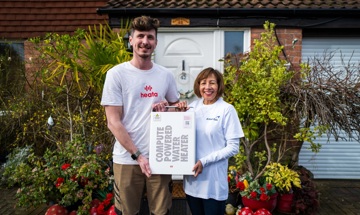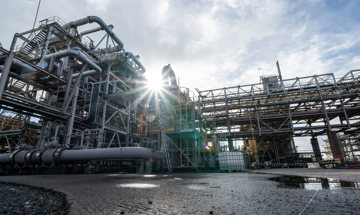Jennifer Plews, Head of Campaigns
Over half (54%) doubt the UK will reach Net Zero by 2050 with those not expecting the target to be achieved until 2075
- Climate change is ranked the fourth most important issue facing the country, after cost of living, the economy and the NHS
- Over half (54%) are not confident that the Government would cut emissions sufficiently by 2050 and 19% think the UK will never achieve Net Zero
- More than half of respondents (51%) said higher energy prices made them more likely to look at “installing energy efficiency products” in the next 12 months
- Only 14% said they would choose a heat pump to replace their existing boiler
- British Gas launches new business unit to support customers in the journey to Net Zero
A new index released today by British Gas will track each year how UK families feel about the journey to Net Zero, their role in it and readiness to make changes to their home and lifestyle.
The Index reveals that when it comes to Net Zero, there is widespread awareness but limited understanding. When Net Zero was explained, 71% of the public agreed that it was the right thing to do. On average, people believe that the UK will reach Net Zero closer to 2075 rather than 2050.
According to the results, climate change is ranked as the fourth most important issue facing the country – with younger people more willing to act and more willing to pay for measures that cut household emissions. Climate change is considered more important by the public than immigration, taxation, housing or Brexit. But unsurprisingly, fears over the cost of living have risen to make this the dominant priority for the British public.
"We hope that this index will help to measure changing attitudes over time and understand how people are feeling about choices in the lead up to the Net Zero target, particularly in light of these difficult economic times."
Andrew Middleton, Managing Director of British Gas Net Zero
When asked what the government should prioritise to deal with the cost of energy bills, the top responses were to build more low-carbon energy sources such as wind and solar farms (52%) and to make people’s homes more sustainable by installing more insulation (46%).
The research also showed concerns about the gaps in government policy to deliver on the Net Zero target, with over half (54%) saying they were not confident that the Government would cut emissions sufficiently by 2050. In fact, one in five (19%) respondents were so pessimistic they thought that the UK would never achieve Net Zero. More than half of respondents (51%) said higher energy prices made them more likely to look at “installing energy efficiency products” in the next 12 months.
Changes in the home
Positively, there was a recognition of the need for changes to be made at home, with more than three quarters (78%) saying they were willing to make changes in their own homes to help tackle climate change. Among homeowners, almost half (48%) said they were willing to install improved insulation in the next two years and 42% said they’d be willing to install solar panels.
Electric vehicles also saw some support from consumers with 35% willing to install a home charger to power an EV – support was stronger in built up areas such as London.
The data shows that there is more uncertainty about low carbon heating. When asked what they would replace their existing boiler with, 37% said a similar gas or oil-fired boiler and only 14% said they’d choose a heat pump. The majority of responses (38%) said they didn’t know what they would choose.

Despite the fact that one in five (20%) believe that there is nothing the UK could do to stop climate change, the UK has made good progress in recent years to reduce emissions and turn to more renewable energy sources. 87% of the public said they supported building more solar power, 84% supported more offshore wind and 81% supported building more onshore wind. New nuclear was more controversial with 48% support.
Andrew Middleton, Managing Director of British Gas Net Zero says: “We hope that this index will help to measure changing attitudes over time and understand how people are feeling about choices in the lead up to the Net Zero target, particularly in light of these difficult economic times. It highlights where there are some uncertainties – such as heat pumps and how to decarbonise heating – where we can focus the support we give to customers.
“Supporting our customers in lowering their emissions at home is at the forefront of our plans. We are committed to working with governments, regulators and legislators to ensure we have the right policies and frameworks in place to achieve net zero by 2050.
“Our engineers have installed over 8,000 electric car charging points, have installed over 1,500 heat pumps and are improving insulation and providing solar panels around the country each day. Focusing on the critical areas of power, heat, transport and the gas network, we hope to accelerate the journey to Net Zero.”
The full report is available to download here: https://www.centrica.com/sustainability/the-british-gas-net-zero-homes-index/
British Gas launches new Net Zero business unit
British Gas is launching a new Net Zero business unit whose sole mission will be to support customers with the journey to net zero by helping them become more energy efficient.
British Gas has the largest energy engineering workforce in the country, with 7,000 engineers who are highly trusted by customers. These are the engineers who will install and maintain the electric vehicle charge points, hydrogen blend ready boilers, heat pumps and more that will be needed to deliver Net Zero in the UK.
The index found that British Gas is the most trusted energy supplier to deliver on Net Zero with two in five (42%) trusting British Gas to help them reduce emissions from their home. And the workforce of skilled British Gas engineers is even more trusted, with 53% saying they’d trust an engineer to provide advice on how to reduce emissions from their home.
British Gas is currently offering heat pumps for £4,999 and expects to install over 1,500 in the next year in a mix of private homes and social housing. Its Hive smart thermostat product which is in almost 2 million homes has also been shown to reduce gas consumption and save an average of £311 per household.

News
British Gas Announces Strategic Partnership with NIBE to Enhance Heat Pump Service and Support
Sustainability

News
British Gas Partners with Panasonic to Provide Service & Maintenance for Panasonic Aquarea Air Source Heat Pumps.
Sustainability

News
Centrica Business Solutions powers Gressingham Foods into a sustainable future
Sustainability

News
Centrica Business Solutions accelerates Solihull Hospital’s journey to net zero with new energy centre
Sustainability

News
British Gas partners with heata on trial to reuse waste heat from data processing
Sustainability

News
Spirit Energy’s Morecambe Gas Hub Marks 40 Years of Powering UK
Sustainability
